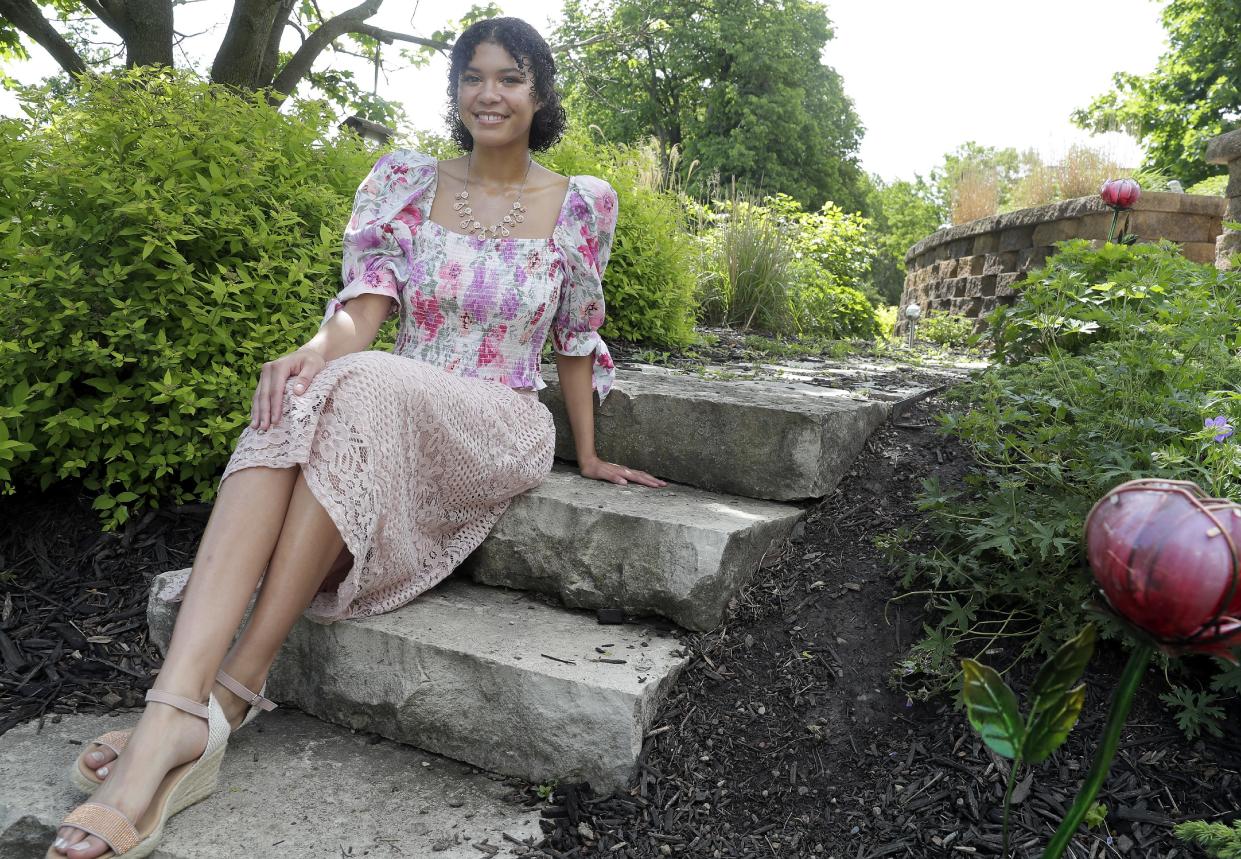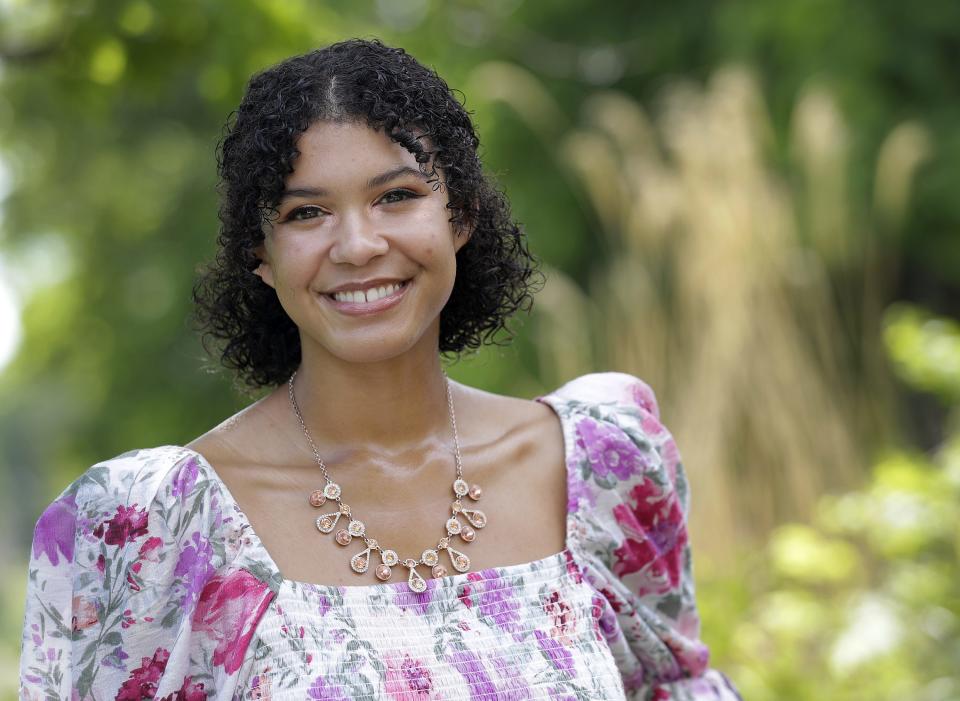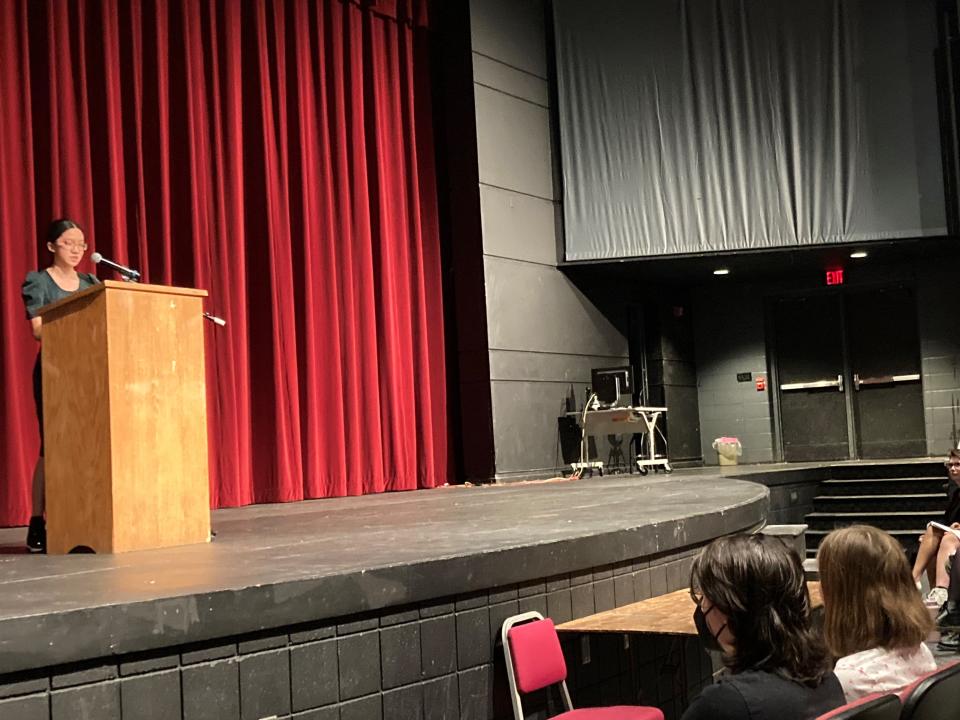How do you tackle stigmas around mental health? Poetry, says one high school student

APPLETON - Mya Koffie is no stranger to difficult subjects, but it’s in the writing of poems she feels released of their burdens.
That was one of the main thoughts that inspired the 17-year-old junior to start the poetry club at Appleton North High School.
Put simply, writing makes her feel better.
"In writing, I find a way to exist in a way the present moment does not always allow — fully, bravely," Koffie said.
At a time when alerts of daily mass shootings emerge in all corners of the country and ongoing civil unrest blares amid a deadly pandemic, Koffie and other students at Appleton North are responding with a message of bold togetherness.
When Koffie enrolled at Appleton North this year, she created and now presides as president of the school poetry club. With about 15 other students, they tackle subject matters that offer a unique perspective to growing up in 2022, suicide and suicidal ideation among them. For Koffie, the topic of suicide prevention is personal. Far too many of her peers grapple with mental illness, and poetry is the perfect medium to speak truth to power.
"The past three years have presented everyone with many unprecedented experiences. These experiences have amplified the intensity of the already very strange teenage experience," Koffie said. "Suicide prevention is very personal to me, and I know countless young people struggle with their mental health."

'Poetry … holds truths that can be too dangerous to speak out loud'
Koffie was initially drawn to poetry because of Maya Angelou — the late poet, author and civil rights activist — whom she picked for a biography project when she was in second grade.
At first, the second grader selected her because they shared a name, but even at a young age, Koffie could delineate Angelou's insights and apply them to her own life experiences.
"I fell in love with her work, or, you know, the kind of work a second grader might appreciate," Koffie said. "From there, poetry became intertwined with my identity."
That braiding of life and literature would eventually push her to carve out a space for poetry at her high school, where she could share her love of poetry with a small group of other impassioned readers.
It also led to her winning a prestigious prize this year. Across 42 schools and among 268 eligible entrees, Koffie won first place in Wisconsin Fellowship of Poets' senior division for her poem, "26 Things to Liquify."
"Poetry has always given me a way to hold the truths that feel too dangerous to speak out loud — the words I have no way of holding," Koffie said.
Those truths that prove difficult for her to process involve suicide and mental illness. It's in her poems where she can address the complications of sexual assault, her identity as a multiracial young woman and oppressive forces within anti-LGBTQ legislation and the killing of unarmed Black people.
Data show suicide rates in Wisconsin are consistently higher than the national average for those age 10-19, with 32% of suicides attributed to family issues and 25% attributed to issues at schools, according to the 2020 report "Suicide in Wisconsin: Impact and Response," released by the Wisconsin Department of Health Services.
Between 2018 and 2020, DHS reported 32 deaths by suicide for the age group 0-14. In the 15-24 age group, there were 1,179 deaths by suicide.
Bringing poetry to Appleton North
Appleton North's poetry club culminated in a showcase connecting poetry and activism May 26 in the school's auditorium. Students read poems that brought to light their history of cutting, recent mental health diagnoses, living with ADHD and autism, eating disorders, personal accounts of trauma and gun violence.
The showcase took place two days following the mass shooting in Uvalde, Texas, a fact that was not lost on the students.
That especially resonated when student Gabrielle Beaman, in her poem "Thoughts and Prayers," recounted being at Fox River Mall with her friends when deadly mayhem struck the mall in a mass shooting last year. She described seeing a body lying in a pool of blood before being escorted outside.
Koffie read a poem called "The Microaggression Tree," which, among other themes, addressed bullies taunting her for talking "like a white girl." The poem emphasized resilience despite the root causes of microaggressions, or the unconscious or unintentional thoughts and actions that reveal prejudiced attitudes toward marginalized groups.
Not all traumas are bound to a specific time and place, which is part of the beauty of poetry, according to Leah Dreyer, an English teacher at Appleton North who functions as the club's adviser.
Dreyer said students gather during homeroom to talk about the power of poetry, share space to hear each other read original work aloud and analyze poems familiar and strange to the students.
"There are some very hard-hitting, distressing and sometimes even disturbing issues that students write about in their work," Dreyer said. "But the reality is that those issues are real and have affected them somehow."

As the adviser of the club, Dreyer is cognizant of her position as both a practitioner of poetry and an educator of students. The subject matter into which students write, she said, can be intense and sometimes troubling, but creative expression outweighs bottling up issues.
"For the students, the poetry they wrote is a form of reaching a sense of finality or closure," Dreyer said. "Even if these painful parts of their lives will still follow them, writing and sharing a poem about it allowed them to truly release those pent-up emotions in a healthy and fulfilling way."
To begin her piece about gender equality and wage gaps, Olivia Feng, a ninth grader, read Maya Angelou's poem, "Equality," which repeats the phrase, "Equality, and I will be free."
Feng uttered the phrase until it became a powerful mantra that dovetailed into her own exploration of gender equality in the workforce she, too, will likely occupy.
Feng, 14, said she felt simultaneously excited and nervous to share her poem. But the power of self-expression trumped any feeling of stage fright she had.
"I was really nervous before the performance, but getting up there and sharing my voice to empower people felt so special," Feng said. "I encourage everyone to share their voice because although it may sound terrifying, you never know who you might inspire."
Between ticket sales, concessions and donations, the poetry club donated $250 in proceeds to the nonprofit Prevent Suicide Fox Cities.
Koffie said she hopes this is a catalyst event for future charity-driven events that the club can put their poems behind. She also hopes such showcases help center the toll of not only the pandemic but on other societal concerns that drive people to contemplate suicide.
"People struggled with suicide every day even before a world-altering pandemic," Koffie said. "The disconnect that COVID-19 caused within communities persists still, even as we fight to forget the stress the pandemic caused."
Natalie Eilbert is a government watchdog reporter for the Green Bay Press-Gazette. You can reach her at neilbert@gannett.com or view her Twitter profile at @natalie_eilbert.
This article originally appeared on Appleton Post-Crescent: Appleton North High School students read poems about mental illness

